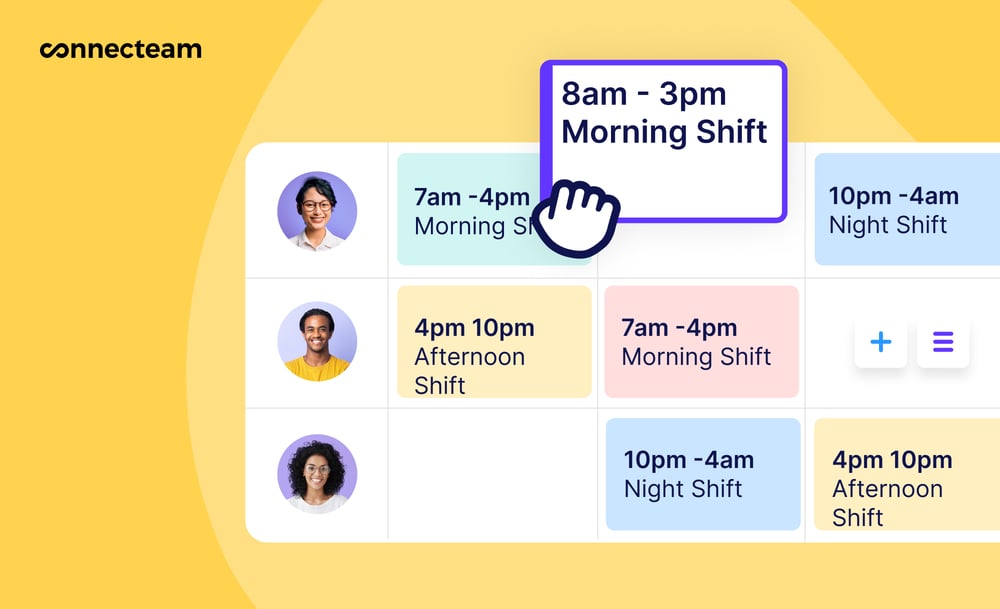This comprehensive guide provides all the necessary insights and steps to establish a thriving staffing agency. From initial planning and hiring staff to effective marketing and operational tips, this article equips you with the knowledge to launch your own successful staffing firm.
Starting a staffing agency in 2023 can be an excellent career choice. However, before getting started, it’s important to have a thought-out plan of execution.
In this article, we’re covering how to start a staffing agency in 12 steps. From determining startup costs to writing a business plan, we’re here to guide you through the process.
What is a Staffing Agency?
Before you start building a staffing agency, let’s make sure you have a complete understanding of its primary objectives.
Often confused with a recruiting agency, a staffing firm is involved from the time employees are recruited by a company to the time they leave. While the primary function of recruiting agencies is to match employers with job candidates and simply facilitate the hiring process, staffing agencies are involved in much more than that.
Staffing firms are involved in the entire employee lifecycle, whether the workers are temporary or permanent hires. Firms are involved in negotiating pay, drawing up contracts, onboarding, training, and retention. If an employee is terminated, the staffing agency will be involved with that, too. Workers’ paychecks and benefits are issued by the staffing agency, but the length of employment is determined by the business.
The primary reason that companies team up with staffing agencies is to help them find and retain good job candidates, cutting down on administrative and HR costs. Job seekers may also seek out staffing agencies to help them find permanent or temporary employment.
12 Steps to Starting a Staffing Agency

Choose the Right Niche
When starting a staffing company, you’re best off catering to a specific niche. That way, you can specialize in certain fields and be seen as more of an expert. That being said, it’s completely possible to scale into different niches as you grow, but figure out where you want to start.
Keep in mind that companies and job seekers will likely be signing up to several staffing agencies. You need to go above and beyond to make sure that you’re the one that ends up placing job seekers in jobs if you want to earn a profit.
Here are four ways to help you choose your niche:
- Consider which industries you have the most experience and knowledge in. This puts you ahead of your competition from the get-go. You can also use your connections to source people and job positions right off the bat.
- Do some market research and see what professions are in the highest demand in your area. For example, if you live in an urban area with lots of hotels, a hospitality staffing agency could be a good fit. This wouldn’t be the case if you lived in a more rural area with fewer hotels and restaurants.
- Stand out from your competition by choosing a niche another staffing agency isn’t already serving.
- Check out some job boards and see if you notice any recurring themes, jobs, or industries in your area. If so, this could mean there is a high demand for these specific jobs, and could be a good niche for you.
- Look at niches within a field. For example, there are a whole range of positions that fall under office administration, such as mid-level administrative support staff to industrial work administrators. Consider niching down and becoming the go-to staffing firm for specific roles.
Pro Tip
Keep in mind that supply and demand are always changing, and you may consider choosing more than one industry to serve. This can increase the number of potential clients and maximizes possible opportunities if there is suddenly less need for specific professions.
If you go this route, it’s important to only select specific industries and not all industries so you can remain an expert in certain niches.
Action items:
Conduct research to find the best niche for your agency. Check out local job boards, use your existing connections, and think about the value you can bring to both your recruits and clients.
Once you choose the right niche, you can get into the real work of building a staffing agency.
Two things to remember here:
- Supply and demand are ever-changing (as the pandemic showed us!) Be prepared to switch up your business model and don’t focus on just one industry – be flexible. You never know when a slump could happen so it might be wise to test out some niche service offerings.
- Your recruits will likely be signing up to several job agencies, as their end goal is to land a job, not be loyal to a certain brand. You need to go above and beyond to make it clear what added value you can bring to them.
Calculate startup costs
When starting any business, you need to consider all of your business costs to determine how much funding you actually need. Startup costs can range anywhere from $5,000 to $250,000, depending on the following factors:
- Office space rent: Monthly rent for office space can vary on your location. If you plan to work remotely, you can disregard this.
- Bills and overhead: If you do rent office space, you’ll need to pay for rent, bills, internet connection, food and coffee for your staff, etc.
- Software: Besides applicant tracking software, you’ll need software for processing payroll and managing your own employees.
- Equipment and supplies: You’ll need furniture, equipment, and office supplies if you plan to work out of an office. Things like computers, printers, pens, notebooks, and phones will be essential.
- Employee salaries: Do some market research to determine average employee salaries in your region.
- Insurance and benefits: All businesses need insurance, like business owner’s insurance and worker’s compensation insurance. You should also consider employee benefits, like health insurance. Check with a reputable insurance company to learn exactly which policies you’ll need.
- Marketing: Consider the types of marketing you’ll do and their subsequent costs. Be sure to take advantage of free marketing channels, like search engine optimization (SEO) and social media posts.
Action items:
If you plan to rent office space, start researching availability in your area. Consider how many employees you’ll be hiring and what equipment you’ll need to purchase. Then, contact an insurance agent to determine what insurance types you’ll need and their costs.
Write a business plan
Once you’ve done your initial research for starting a staffing agency, it’s time to write a business plan. Not only does a plan provide structure to get your business going, but it helps you think about potential roadblocks you may encounter throughout the process.
Your business plan should include the following sections:
- Executive summary
- Description of the business
- Market and competitive research
- Marketing plan
- Financial plan
- Operating plan
- Management plan
Action items:
Check out our article, How to Write a Business Plan in 9 Steps, for a complete break down of how to create this important document. You’ll learn everything about the importance of having a solid business plan as well as tips for creating your own.
Come up with a business name
While you’re creating a business plan, you should start thinking about a name for your staffing agency. Your business name is incredibly important and should represent your business accurately.
The name of your staffing agency should represent the value and culture of your soon-to-be business. Consider the niche you plan to serve and how you plan to brand your agency. Do you want your business name to be fun and trendy or professional and earnest?
Whatever name you choose, it should flow and make your business stand out from others.
Here are a few business name types with a few examples to help you come up with your own:
- Descriptive: These names indicate what you offer and don’t leave much room for misinterpretation. Examples include: Pizza Hut, Bath and Body Works
- Acronyms: An acronym strings together the first letter of each word in your business name and doesn’t give away what your business offer. Examples include NASA and GEICO.
- Fun fact: GEICO stands for Government Employees Insurance Company, but not many people know this. GEICO then took the similar-sounding word, gecko, and used it as a central component of its branding.
- Geographical: These business names link a business to its location, which can make it more difficult (but not impossible) to work outside of their locations. Examples include: California Pizza Kitchen, New York & Company.
- Founder business name: This type of business name has the name of the founder in it, helping to personalize the brand. Examples include: Johnson and Johnson, McAfee
Come up with a few options and run them by a test audience (friends and family work just fine for this). You may also want to consider using a free business name generator to gather ideas, such as:
Then, head over to the website of the United States Patent and Trademark Office (USPTO) to make make sure your name isn’t already trademarked. If it is, you’ll need to think of an alternative.
Action items:
Start brainstorming potential business names and run them by a few trusted people to gauge their reactions. Use their feedback to make any adjustments. Also, check out one of the free business name generators listed above and check USPTO’s website to make sure your winning idea is available.
Obtain the necessary licenses and an EIN number
No matter in which city or state you start your staffing agency, you’ll need to get certain licenses and permits to become a legal business entity–although they may vary slightly depending on your location.
Staffing agencies don’t require federal business licenses, but you will definitely need one from your city or county. In addition, 24 states currently require staffing agencies to obtain an Employment Agency License, which legally allows businesses to find employment for job seekers.
Once you register your business, you’ll need to apply for an Employer Identification Number (EIN). Also known as a Federal Employer Identification Number, this 9-digit number is assigned by the IRS and used to identify your specific business.
Action items:
Head over to your city’s website and find out how to obtain a business license and what paperwork you’ll need. For more information, check out the U.S. Small Business Administration’s page on how to register a business.
Purchase insurance
You’ll need to purchase business insurance for your staffing agency to protect yourself from liabilities.
Some common types of insurance include:
- Business owner’s policy
- Commercial general liability insurance
- Employee theft and crime coverage
- Employment practices liability insurance
- Key employee insurance
- Professional liability insurance
- General liability insurance
- Workers’ compensation
- Property coverage
- Umbrella policies
- Business auto insurance (if you have a company car)
Not all of these insurance policies will be relevant to your staffing firm, but depending on your niche, you’ll need multiple types of insurance.
Action items:
Contact a few reputable insurance agents in your area and find out what types of insurance you’ll need for your staffing firm. Compare prices and choose the insurance company you feel most comfortable with.
Choose the right software
Choosing the right software for your staffing agency is essential for its success. These are the 3 primary types of software you’ll need:
- Applicant Tracking System (ATS): This software acts as a candidate database. It helps manage the hiring process and track applicants. You can post job openings, screen candidates, schedule interviews, and communicate with candidates. It should also integrate with job boards to help you reach more potential applicants.
- Payroll software: Payroll software is an absolute must because it streamlines and automates the entire payroll process. It’s essential for accurately calculating salaries, tax rates, and generating reports.
- Employee management software: Ensure your business runs as efficiently as possible by using an employee management app, like Connecteam. This mobile-first solution gives you all the tools you need to manage your daily processes with complete ease and efficiency, even while on the go.
Here’s just a few ways Connecteam can help you manage your staffing agency:
Simplifies the scheduling process
Connecteam’s advanced employee scheduler allows you to schedule your staff based on their qualifications, availability, and location, making it easy to assign all the right people to the right jobs.
This feature is a lifesaver when it comes to scheduling hourly workers, and includes multiple timesaving capabilities, like shift templates, open shifts, and self-service shift replacements. You can also add shift information and instructions so your staff knows exactly what is expected of them–and can get right to it without unnecessary back-and-forth.

Tracks employee hours
Hourly workers can clock in and out of their shifts directly from their phones with Connecteam’s employee time clock. Then, the app tracks employee hours and creates automated timesheets so you don’t have to manually add up any hours.
If your employees are salaried, you can use Connecteam’s timesheets feature to monitor days worked, sick days, and PTO.
Enhances communication amongst your employees
Connecteam offers instant and secure communication though a built-in online team chat. Instantly communicate with your staff via private or group chats based on their roles in your agency. This is the most efficient way to communicate with your staff and eliminates the need for back-and-forth texts, calls, and emails.
Using the company employee directory, all of your staff have access to each other’s contact information. You can even store up-to-date client contact details here, too, along with relevant contact preferences and information. Keep these details safe within your staffing agency by enabling employees to contact clients directly from the app, without first having to save contacts to their phones.
Makes it easier to manage PTO
Connecteam offers a unified dashboard so you can easily see all PTO requests in one place. The app allows you to track PTO balances, save employee hours, and even publish your time-off policy so employees have instant access to it.
Streamlines the payroll process
Automated timesheets for your hourly and salaried workers means there’s no chance for any payroll errors to slip by you: you’ll pay employees (and charge your clients) according to their clock-ins and clock-outs. Also, Connecteam integration with QuickBooks Online and Gusto ensures 100% accurate payroll.
Consolidate business information to one, central location
Keep all of your business information in one place with Connecteam’s team documents feature. This may include client contact information, employee documents and benefits, and digital forms. You can also take advantage of the company knowledge base to digitally store any critical knowledge you want your employees to have instant access to. Think organizational charts, company policies, training documents, and more.
Open a business bank account
Opening a business bank account helps ensure legal compliance with regulatory and tax obligations. Your bank statements will provide financial documentation that proves you are conducting business legally. It also makes doing your taxes a whole lot easier. By linking your business bank account transactions with tax preparation software and bookkeeping software, you can automate the process and eliminate having to manually add up your cash flows.
Separating your business transactions from your personal ones also prevents confusion: business transactions are clearly documented within the account so you, as a business owner, can more easily track them. It also allows you to establish and grow business credit. If you have solid business credit, you’ll have a much easier time taking out a loan with a decent interest rate.
Another major benefit of a business bank account is that it makes you eligible for certain financial perks and services from the bank. These can include merchant services for accepting payments, business credit cards, business loans, overdraft facilities, and other financial products that support business operations and the growth of your staffing firm.
Action items:
Look up a few local banks in your area and check out the benefits they offer to business owners. You may also consider heading to each bank in person to gather more detailed information about opening an account.
Develop a marketing plan
Starting a staffing agency all starts with a solid marketing plan. It’s the key to finding clients and advertising your services. Keep in mind that you will likely need to market to both job seekers and businesses that may want to team up with you to find them workers.
Here’s a quick 5-step overview of how to create a marketing plan for your staffing agency:
- Define your target market. Determine the specific clients, job seekers, and industries you plan to work with and direct your marketing efforts toward them.
- Solidify your branding. This includes everything from your logo, tone of voice, brand colors, and imagery. Branding authenticates your business, helps you stand out from your competitors, and allows potential clients to feel personally connected to your company. All of your marketing assets should align with your branding.
- Set marketing goals and objectives. Clearly define what goals you want to achieve with your marketing strategy. For example, “Place 50 candidates in jobs after the first 6 months of operating.” To create reasonable goals, you’ll need to conduct proper market research to determine what’s achievable.
- Outline your marketing strategies. Check out possible marketing channels, like paid advertising on social media and Google, and free opportunities like search engine optimization (SEO). How you determine which strategies you go with may vary depending on how much time you have and your budget.
- Track your success: Continuously monitor and analyze the effectiveness of your marketing efforts. That way, you can make adjustments as needed and use real data to make new decisions.
Action items:
You’ve likely already begun thinking about how to brand your staffing agency, but now’s the time to really solidify it. A great way to create your brand image is to first come up with a brand positioning statement, a short message that outlines exactly what you offer. Here’s a template to get you started:
We offer [service] for [target market] to [value proposition].
Consider your brand personality, messaging, and logo. Then, explore the marketing opportunities available to you and begin creating a plan.
This Might Interest You
Check out our article on 11 Effective Strategies for Staffing Business Development to learn about how to maximize your business success.
Build a website
You can’t solidify your place as a reputable staffing agency without a well-designed website. A business website is often potential clients’ first impression of your business, acts as your staffing agency’s online presence, and provides essential details about your services. It also acts as a powerful marketing tool for potential clients.
Be sure to include an About Us section, the types of industries you serve, and how clients can get in touch with you. And in terms of design, it should be easy to navigate and align with your branding.
There are tons of website builders on the market that offer premade website templates to help you design a professional-looking site yourself. And with the rise of AI, this process has become even simpler. Check out some of our top picks, including Wix, Squarespace, Durable, and Elementor. However, if your budget allows it, you may want to hire a web designer to take care of this for you.
Lastly, create and secure your domain name. Website builders come with a tool to do this, but if you hire a web designer, they should take care of this for you.
Action items:
Determine your budget for creating a website. Decide if you want to hire a web designer or use one of the many website builders on the market.
Hire the right staff
If you’re starting your business alone, you may be the only employee for awhile–at least until your firm gets up and running. Once your business starts to grow, here’s a list of positions you may want to hire:
- Business development manager: This employee is responsible for generating new leads, building relationships with clients, and securing contracts with companies seeking staffing services.
- Recruitment manager: The recruitment manager oversees the entire recruitment process for employees your agency places. This includes finding candidates, conducting interviews, and evaluating potential hires. They should have a strong understanding of the job market and excellent networking skills.
- Recruiting coordinators: Recruiting coordinators provide support to the recruitment manager, assisting with candidate sourcing, screening, and coordinating interviews.
- HR specialist: This role is essential for ensuring compliance with employment laws, managing employee benefits, handling payroll, and addressing any HR-related issues within the agency.
- Operations manager: An operations manager oversees the day-to-day operations of the agency, including administrative tasks, resource management, and process improvement. They ensure that all operations run smoothly and efficiently.
- Marketing specialist: If you don’t want to do your marketing yourself, a marketing specialist may be a good hire. This person develops and implements marketing strategies to promote the agency’s services, increase brand awareness, and attract both clients and candidates. You may also want to hire an external marketing firm if you don’t want to hire someone in-house.
- Finance or accounting specialist: This person handles financial management, budgeting, bookkeeping, payroll, and tax-related matters. They ensure accurate financial records and help with financial planning and analysis.
- IT specialist: Given the increasing reliance on technology, an IT specialist is crucial. They manage the agency’s technology infrastructure, software systems, data security, and troubleshoot any technical issues that arise.
Action items:
Make a list of the staff you plan to hire. If hiring immediately, start advertising on job boards like LinkedIn and Indeed to get the word out.
Did You Know?
Connecteam’s employee management app comes with 24/7 customer support to help you sort out any technical issues that may arise.
Get started with Connecteam for free!
Open for business and start sourcing candidates
Now that you’ve laid the ground work, it’s time to open for business. Use your selected marketing channels to seek out clients and business to partner with. Long-term business partnerships are particularly important because they’ll likely be able to offer your staffing agency continuous work. Forming good relationships with these clients is also important because they can provide referrals for other businesses that are interested in hiring your staffing firm.
When a business hired you to fill a position, advertise on job boards to get the word out. It’s okay to get a bit aggressive here–feel free to personally message individuals on LinkedIn and let them know you’re hiring for a certain position to see if they’re interested.
Remember: businesses usually partner with multiple staffing agencies, so you’ve got your work cut out for you. If you’re the one that fills open positions first, that business will be more likely to continue working with you in the future.
Action items:
Start advertising your services and forming relationships with clients. Perfect your pitch and make sure you can clearly communicate the benefits of your services.
How Do Staffing Agencies Make Money?
Here’s how staffing agencies usually make money: companies pay staffing agencies to find employees, which saves them administrative and HR costs. They also save money by not having to pay for online job boards, like LinkedIn or Indeed.com.
Then, when the agency matches a jobseeker with an employer, the employer pays a hiring fee and agencies get a cut from the employee’s paycheck.
The fee charged to both the employee and employer can vary on the location, the industry, and supply and demand. This is why some industries in hard-to-reach areas might have higher profit margins for staffing companies than more accessible locations and less desirable industries with a lot of potential candidates.
How Much Does it Cost to Start a Staffing Agency?
The cost to start a staffing agency will depend on many factors and is difficult to break down specifically, but can range from $5,000 up to $250,000. Location is one of the biggest factors, along with how many employees you plan to hire, whether or not you want to lease office space, and how much profit you take for placing workers in jobs.
If you don’t have enough money to cover start-up costs, you can look into loans from banks or the Small Business Administration.
This Might Interest You
We put together a list of the 10 Best Online Resources to find Small Business Grants for Women.
The Bottom Line on How to Start a Staffing Company
By following the 12 steps outlined in this article, you can lay a strong foundation for your staffing agency’s success. Remember to thoroughly research the market, establish a solid business plan, build a strong network, and leverage technology to streamline your operations.
With dedication, adaptability, and a commitment to providing exceptional service, your staffing agency has the potential to thrive in the dynamic world of workforce solutions. So, take the leap, embrace the challenges, and embark on a journey that can lead to a fulfilling and prosperous career in the staffing industry.




